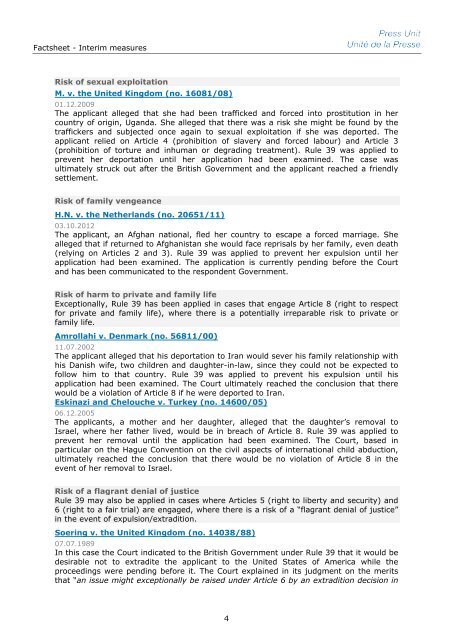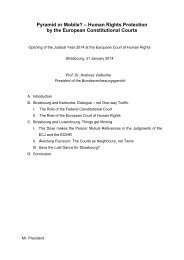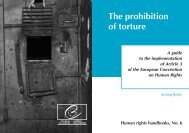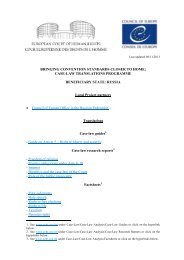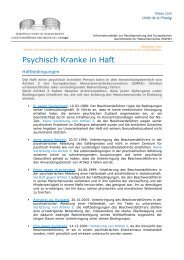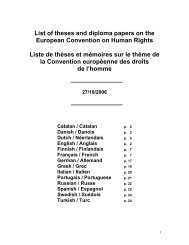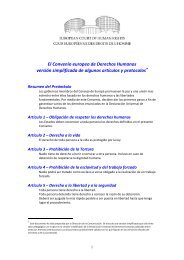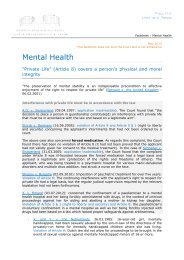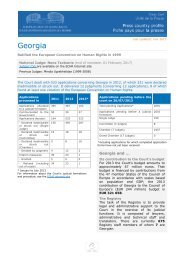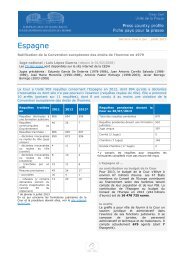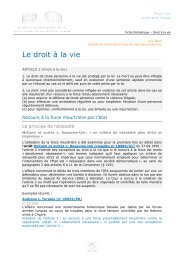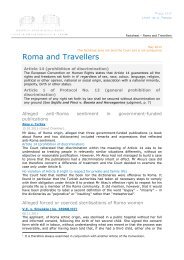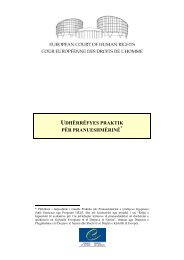Factsheet Interim measures - European Court of Human Rights ...
Factsheet Interim measures - European Court of Human Rights ...
Factsheet Interim measures - European Court of Human Rights ...
You also want an ePaper? Increase the reach of your titles
YUMPU automatically turns print PDFs into web optimized ePapers that Google loves.
<strong>Factsheet</strong> - <strong>Interim</strong> <strong>measures</strong><br />
Risk <strong>of</strong> sexual exploitation<br />
M. v. the United Kingdom (no. 16081/08)<br />
01.12.2009<br />
The applicant alleged that she had been trafficked and forced into prostitution in her<br />
country <strong>of</strong> origin, Uganda. She alleged that there was a risk she might be found by the<br />
traffickers and subjected once again to sexual exploitation if she was deported. The<br />
applicant relied on Article 4 (prohibition <strong>of</strong> slavery and forced labour) and Article 3<br />
(prohibition <strong>of</strong> torture and inhuman or degrading treatment). Rule 39 was applied to<br />
prevent her deportation until her application had been examined. The case was<br />
ultimately struck out after the British Government and the applicant reached a friendly<br />
settlement.<br />
Risk <strong>of</strong> family vengeance<br />
H.N. v. the Netherlands (no. 20651/11)<br />
03.10.2012<br />
The applicant, an Afghan national, fled her country to escape a forced marriage. She<br />
alleged that if returned to Afghanistan she would face reprisals by her family, even death<br />
(relying on Articles 2 and 3). Rule 39 was applied to prevent her expulsion until her<br />
application had been examined. The application is currently pending before the <strong>Court</strong><br />
and has been communicated to the respondent Government.<br />
Risk <strong>of</strong> harm to private and family life<br />
Exceptionally, Rule 39 has been applied in cases that engage Article 8 (right to respect<br />
for private and family life), where there is a potentially irreparable risk to private or<br />
family life.<br />
Amrollahi v. Denmark (no. 56811/00)<br />
11.07.2002<br />
The applicant alleged that his deportation to Iran would sever his family relationship with<br />
his Danish wife, two children and daughter-in-law, since they could not be expected to<br />
follow him to that country. Rule 39 was applied to prevent his expulsion until his<br />
application had been examined. The <strong>Court</strong> ultimately reached the conclusion that there<br />
would be a violation <strong>of</strong> Article 8 if he were deported to Iran.<br />
Eskinazi and Chelouche v. Turkey (no. 14600/05)<br />
06.12.2005<br />
The applicants, a mother and her daughter, alleged that the daughter’s removal to<br />
Israel, where her father lived, would be in breach <strong>of</strong> Article 8. Rule 39 was applied to<br />
prevent her removal until the application had been examined. The <strong>Court</strong>, based in<br />
particular on the Hague Convention on the civil aspects <strong>of</strong> international child abduction,<br />
ultimately reached the conclusion that there would be no violation <strong>of</strong> Article 8 in the<br />
event <strong>of</strong> her removal to Israel.<br />
Risk <strong>of</strong> a flagrant denial <strong>of</strong> justice<br />
Rule 39 may also be applied in cases where Articles 5 (right to liberty and security) and<br />
6 (right to a fair trial) are engaged, where there is a risk <strong>of</strong> a “flagrant denial <strong>of</strong> justice”<br />
in the event <strong>of</strong> expulsion/extradition.<br />
Soering v. the United Kingdom (no. 14038/88)<br />
07.07.1989<br />
In this case the <strong>Court</strong> indicated to the British Government under Rule 39 that it would be<br />
desirable not to extradite the applicant to the United States <strong>of</strong> America while the<br />
proceedings were pending before it. The <strong>Court</strong> explained in its judgment on the merits<br />
that “an issue might exceptionally be raised under Article 6 by an extradition decision in<br />
4


